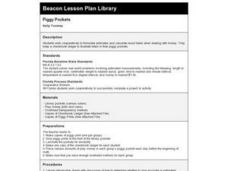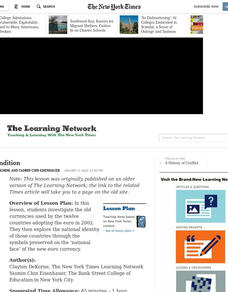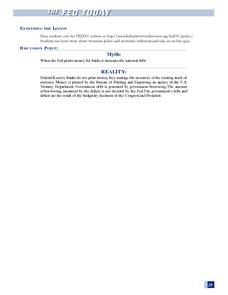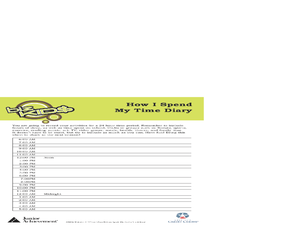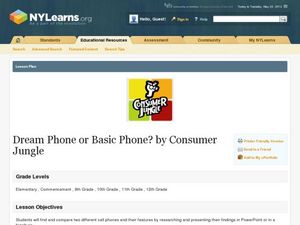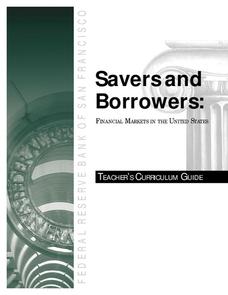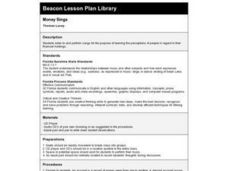Curated OER
Greece Adopts the Euro
Students examine the European Union and how it adopted a single currency, the Euro. They research a number of websites to explain the Euro and its current value.
Curated OER
Piggy Pockets
Second graders determine when estimates and exact totals are appropriate in dealing with money. They simulate keeping a checking account over a period of time and keep a checkbook ledger to record deposits and expenses.
Curated OER
Pocket Change
Students explore algebraic relationships using the coins in their "pocket." Interactive games that demonstrate the use of estimation in algebraic problem solving help them build a framework for understanding word problems in a way that...
Curated OER
Mint Condition
Students investigate the old currencies used by the twelve countries adopting the euro in 2002. They explore the national identity of those countries through the symbols preserved on the 'national face' of the new euro currency.
Curated OER
Jobs in the Community
Students build a mobile representing different jobs in the community. In this economics lesson, students discuss the importance of working for money, brainstorm various jobs, and look through pictures and magazines to locate different...
Curated OER
Banking Grammatically
Twelfth graders identify the different roles involved in banking. They list and create defintions for the different types of banking services offered at a branch office.
Students write sentences using verbs in present and past tenses....
Curated OER
Bank Comparison Activity
Students experience the responsibility of finding a bank that fits their needs. They describe the role of planning and maintaining a balanced budget. Students view brochures from various banks or websites to various banks.
Curated OER
Inflation and Money
Students define money in terms of its functions and refer back to discussion of markets and the role of money in reducing transaction costs. They give examples of types of money.
Curated OER
Who Gets the Money?
Young scholars determine the characteristics of a good loan. Using a Loan Considerations worksheet, they examine and discuss their assigned credit area and list what characteristics, as a lender, a repayable loan should have.
Federal Reserve Bank
The Fed's Role in Making and Setting Monetary Policy: Part 2
How does the Federal Open Market Committee work to formulate the nation's monetary policy in the United States? As the second segment of a lesson on the role of the Fed in setting monetary policy, class members will learn about open...
Curated OER
How to Achieve Your Financial Goals
Students explore economics by creating a budget. In this financial goal setting instructional activity, students investigate their use of time by completing a worksheet. Students identify financial goals they would like to achieve in the...
Curated OER
Dream Phone of Basic Phone?
Learning to be a savvy shopper can make or break the bank. Upper graders research five different cell phone carriers to see if they'll have enough money in their imaginary budget for a dream phone or a basic phone. They create either a...
Federal Reserve Bank
Creditors’ Criteria and Borrowers’ Rights and Responsibilities
Discover what criteria creditors use for making loans (the 3 Cs of Credit), and impress upon your young adults the rights and responsibilities related to using credit. Pupils role play as individuals seeking or providing credit, as...
Federal Reserve Bank
Your Budget Plan
What do Whoosh and Jet Stream have in common? They are both characters in a fantastic game designed to help students identify various positive and negative spending behaviors. Through an engaging activity, worksheets, and...
Curated OER
"Golden" Years?
The Golden Years? Upper graders may think retirement is a long way off, but in life everything is just around the corner. They consider what it means to retire and the current trend of parents working for their Students. They research...
Curated OER
Savers & Borrowers: Financial Markets in the United States
Investigate the current financial market and have your class explore savings, borrowing, financial markets, mutual funds, and the stock market. This four-part lesson is designed to help students become knowledgeable and informed consumers.
Curated OER
Spend, Save or Donate
Learners identify the difference between spending, saving, and donating. They brainstorm reasons to give and options to donate. They sing a song about donating to charity.
Curated OER
Beyond the Checkbook: Choices of Payment Methods
Students explore different payment methods. In this math lesson, students discuss the difference between writing a check and paying online. They will compare and contrast and present their data to the class.
Curated OER
In the Bag!
Students calculate how many quarters are in a $1,000 bag (after learning the dollar value of filled coin bags). They explain their problem-solving strategy using pictures, numbers, equations, and/or words.
Curated OER
Under the Bed or in the Bank?
Students explore personal finance. In this consumer /financial mathematics lesson, students compare interest rates as they explore savings.
Curated OER
The Case of the Broken Piggy Bank
Students list the value of a quarter, dime, nickel, and penny in dollar form. They find the total monetary value of a set of quarters, dimes, nickels, and pennies. They calculate change received on a purchase.
Curated OER
Beat the Bank
Students play a coin identification game to familiarize themselves with coin values. They add coin values to determine the game's winner.
Curated OER
The Euro: Money Changes Everything
Students explore the impact of the euro on nations of the European Union (EU). In this euro instructional activity, students examine exchange rates within the EU as well as outside the EU in order to better understand the implications...
Curated OER
Money Sings
Students listen to and perform songs for the purpose of learning the perceptions of people in regard to their financial holdings.
Other popular searches
- Money and Banking
- Economics Money and Banking
- Economics Money and Banking
- Money Banking
- Law Money Banking

